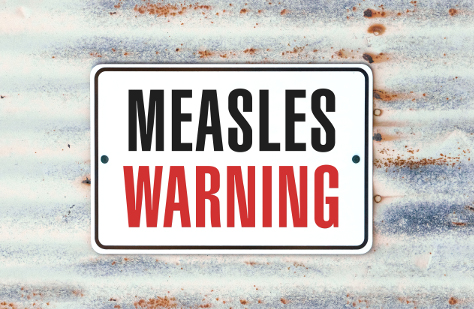What is measles?
Measles is a highly contagious viral disease which can develop into serious illness, including pneumonia and, less commonly, encephalitis (inflammation of the brain). In rare cases a complication of the eyes can develop, and this can result in blindness.
Measles most often occurs in pre-school age children, although anyone unprotected by the vaccine can catch it.
Thanks to the MMR (measles, mumps and rubella) vaccine, which is given as part of the childhood immunisation programme, cases of measles are rare, but there was a marked upsurge in diagnoses between 2010 and the first half of 2011, which is a good argument for every parent taking up the MMR vaccine for their child.
Measles is caught by contact, either by inhaling airborne droplets from when an infected person sneezes or coughs, or by touching germs that have landed on hard surfaces, then transferring them to your mouth or nose.

What are the symptoms of Measles?
There's an incubation period of 10 days, after which the first symptoms of measles appear. They include a runny nose; watery, swollen eyes; a dry cough; reduced appetite; sensitivity to light; fever (temperature of 38°C or above); tiredness and irritability; a rash of greyish spots in the mouth and throat; general achiness.
A couple of days after these initial symptoms emerge, a rash of reddish-brown spots appears, usually in a certain order: behind the ears; around the head and neck; over the legs; then over the rest of the body. They start off small, then grow larger and run into each other. The rash usually fades after three or four days.
All in all the illness lasts for about 14 days from when the first symptoms appear.
What are the treatments and remedies of Measles?
There's usually no treatment required for measles, except to give your child plenty of fluids and rest.
You can give infant paracetamol or ibuprofen to help reduce fever and ease aches and pains.
If your child is sensitive to light, keep curtains closed.
If your child develops a secondary infection, your GP may prescribe antibiotics.
This guide
The information in this Bounty A-Z of Family Health is not a substitute for an examination, diagnosis or treatment by a doctor, midwife, health visitor or any other qualified health professional. If in doubt, always speak to a doctor.
Bounty will not be held responsible or liable for any injury, loss, damage, or illness, however this occurs or appears, after using the information given on this website and in particular the A-Z of Family Health.
Further help
For health advice and information 24 hours a day, 365 days a year, the NHS offers call and web services. You can also visit NHS websites for services, health information and health news at nhs.uk
- England – call 111 from any landline or mobile phone free of charge, or visit nhs.uk
- Scotland – call 111 from any landline or mobile phone free of charge, or visit nhs24.com
- Wales – call 0845 4647 , or visit nhsdirect.wales.nhs.uk
- Northern Ireland – visit hscni.net